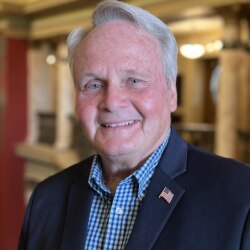The Jews Of Montana
"All of us should be proud of what Nicky Winton did to save so many, and proud of Montana’s Jewish heritage too."
In the historic district of Montana’s capital city sits a quaint home built nearly a century and a half ago. Known as the Feldberg House, it’s named for the man who built it in 1875, Jacob Feldberg. He and his wife Emma were prominent members of Helena’s small but thriving Jewish community in the years before statehood.
The citizens of Helena regarded the successful merchant Jacob as a hero. Ellen Baumler, in More Montana Moments, noted that when a fire threatened the city in 1871, he “organized a bucket brigade, and saved the neighborhood,” earning him the nickname, “Helena’s Paul Revere.”
Jewish entrepreneur Marcus Lissner owned the International Hotel in Helena and served six terms on the City Council. The hotel burned several times in the many blazes that bedeviled Helena’s fire-prone business district in the 1860s and 1870s. So persistent was Lissner in rebuilding it that locals eventually referred to it as “The Phoenix.”
Montana’s Jewish population in 1899 numbered some 2,500. It dipped to about a thousand a century later but has staged a rebound in recent years as the Bozeman, Missoula, Billings, and Flathead Valley areas boomed. Rabbi Chaim Bruk, co-CEO of Bozeman’s Chabad Lubavitch of Montana, tells me it’s “one of the fastest growing Jewish communities in the Pacific Northwest.” Bruk says that though comprising less than one percent of the state’s residents, about 5,000 Jews call Montana home today.
Jacob Feldberg and Marcus Lissner were two of the numerous and fascinating Jewish citizens in the Treasure State’s past. Another was Henry Jacobs, who built a successful clothing store business and was elected the first mayor of Butte in 1879. Samuel Schwab and Edward Zimmerman ran the Cosmopolitan Hotel in Helena and built the first four-story building in the city in the 1880s. Other Jewish Montanans thrived in mining, merchandising, railroads, livestock, medicine, meat packing, jewelry and candy making.
Though I am not Jewish myself, I am drawn to stories involving Jewish survival in the face of relentless jealousy and persecution over the centuries. One particular story became a very personal one and, I’m thrilled to note, is now a major motion picture. It involves a famous Brit I came to know, Sir Nicholas Winton.
“Nicky” as his friends called him, was a successful London stockbroker by the age of 30. As he built his business, he watched with horror when Adolf Hitler gobbled up Austria in 1938 and threatened other neighbors in the months that followed. The world breathed a sign of relief when war was temporarily averted by the Munich agreement of September 1938, whereby Britain and France appeased the German dictator with a chunk of Czechoslovakia.
Nicky Winton was not so naïve. He knew Hitler would not be satisfied, that war and empire were his ultimate aim. On a Christmas visit to the Czech capital of Prague in December 1938, he toured refugee camps full of thousands of Jewish families from central Europe. At the onset of winter, most were living in tents with little but the clothes on their backs. He was stunned by so many parents who approached and pleaded with him to get their children out of the country.
The dire straits these Jewish families faced were real indeed. The Nazis seized the whole country in March 1938, and World War II began just six months later when Hitler invaded Poland. The immediate problem, however, was that the families had no place to go. The rest of Europe and the United States would not take them in, claiming that Hitler had promised at Munich he would go no further.
Imagine how desperate a mother or a father would have to be to beg a perfect stranger to take their child to safety! Nicky could have said, “Sorry, I’m only one man and there’s nothing I can do.” But he swung into action and accomplished the impossible. He ended up arranging the transport of 669 imperiled Jewish children from Czechoslovakia to foster homes in Britain, almost none of whom ever again saw their parents, who perished in the Holocaust.
In the wake of World War II, the Winton story was largely forgotten. Even the children grew up not knowing who had saved their lives, until 50 years later when the full story, miraculously, became widely known. Nicky was subsequently knighted by Queen Elizabeth II and lived until 2015, when he died at the age of 106. I often visited him at his home in Maidenhead, England, during his last 15 years.
“One Life” starring the venerable Anthony Hopkins as Nicky Winton is a new film available for streaming now. It’s terrific and quite accurate, though I offer one caveat: A very brief reference is made to Nicky’s “socialist” views as a young man. That’s true, but he grew out of it as he matured. When I asked him who his favorite Prime Minister was, he unequivocally responded, “Margaret Thatcher.”
All of us should be proud of what Nicky Winton did to save so many, and proud of Montana’s Jewish heritage too.
*****
Lawrence W. Reed writes a monthly column for the Frontier Institute in Helena, on whose board he serves. He is president emeritus of the Foundation for Economic Education and blogs at www.lawrencewreed.com.
